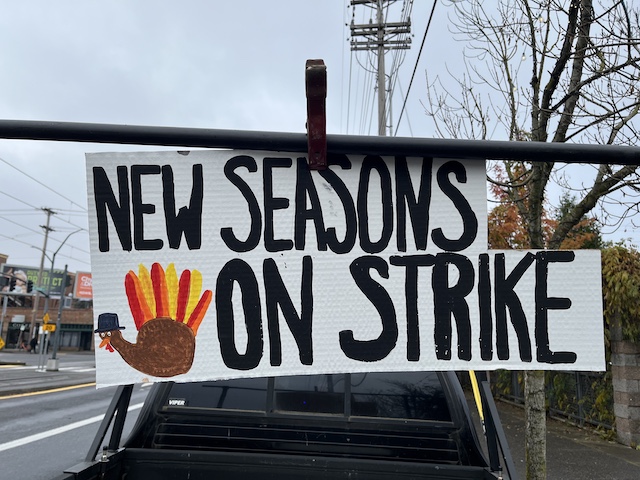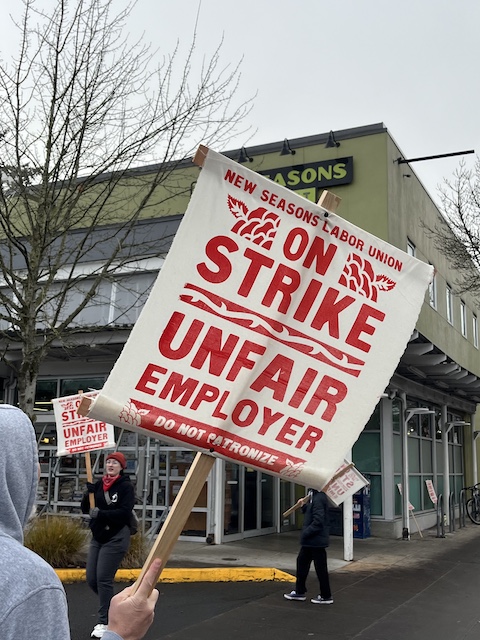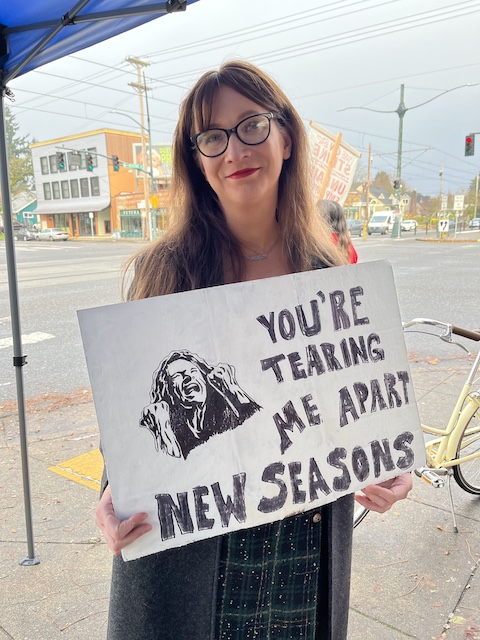
Story and photos by Pete Shaw
Over 1,100 New Seasons Market workers from 11 Portland area stores went on a one day strike on Wednesday November 28. The New Seasons Labor Union (NSLU) called the strike in response to the company’s “numerous ongoing unfair labor practices.” Would-be shoppers were met by picketing union members and community supporters, and provided information about the strike. Most of them turned away, and on the day before Thanksgiving, one of the busiest grocery shopping days of the year, the affected stores’ parking lots were often empty.
The union recently filed Unfair Labor Practice charges with the National Labor Relations Board for “refusal to bargain/bad faith bargaining.” The union had also filed numerous prior charges. Those allegations accuse New Seasons management of unilateral changes to terms and conditions of employment, refusal to furnish information, and coercive rules and statements, among other charges. In response to these issues, 82% of workers at the 11 unionized stores voted to authorize the strike.
“We have made our best effort to offer the company numerous ways to avert a strike by ceasing their unfair labor practices and offering our members a deal that meets their needs, yet they refuse” said Ava Robins, Co-Chair of the NSLU.
The union is also calling for a customer boycott this holiday season, or until the contract fight is resolved.
The 11 stores impacted by the strike kept their usual hours. At the Arbor Lodge store, between 8 and 10 AM, only four vehicles crossed the 35 union and community members’ picket line. One of them was a delivery van, and the other a street sweeper for cleaning the parking lot. As the sweep worker exited after completing their work, they gave a long honk of support. Numerous passing drivers also blared their horns in support of the striking workers. As well, some supporters from the neighborhood brought food and hot beverages.
Since beginning bargaining in early 2023, the workers represented by the NSLU have been attempting to reach an agreement on a first contract with New Seasons. However, bargaining representatives from the union say the company is not offering a viable path forward.
“We’ve been trying to bargain for a contract for just about two years,” said Angelina, who is part of the organizing committee at Arbor Lodge New Seasons. “In that time, the company had not presented any economic proposal to us, although we presented a really thorough economic proposal to them right off the bat. At the most recent bargaining sessions in early and late November, they finally presented economic proposals to us, and they are worse than what we have now on wages and benefits.”
According to a press release from the NSLU, management’s most recent proposal included “a dismal increase of twenty-five cents on the starting wage, decreases to higher paid union workers, a reduction in holiday pay, and increasing the eligibility minimum for benefits and PTO (paid time off) from 24 to 30 hours a week.”

At the prior bargaining session, the company offered all bargaining unit employees “a one-wage model that would cut the wages of 50% of their employees by setting everyone at $20 an hour, or gave the option to entirely get rid of company-provided health insurance for all store employees in exchange for a marginally higher wage.”
The union rejected both offers.
As well, the company told the union that it “intended to offer additional holiday bonus pay to non-union stores workers, but were set on only offering this to union workers if they waived their right to strike during the holidays.”
Among the union’s demands are a living wage along with a cost of living adjustment that accounts for inflation up to 5% each year. According to the Massachusetts Institute of Technology’s (MIT) Living Wage Calculator’s most recent data from February 2024, the living wage in the Portland-Vancouver-Hillsboro region for a single adult with no children is $27.04 an hour. MIT defines a living wage as “the hourly rate that an individual in a household must earn to support themselves and/or their family, working full-time, or 2080 hours per year.”
Regarding management’s last wages and benefits proposal before the strike, Brian Berry, store representative for Arbor Lodge, said, “Their initial offer was to compress everyone’s wage to $20 an hour, which is slightly less than the average current wage. For long time workers who make more than $20 an hour, the company was asking them to take a pay cut.”
Those long time workers make up about half of the bargaining unit’s members.
“Workers were extremely frustrated and insulted by that offer,” Berry continued. “At the last bargaining session, they had another wage offer that was more in line with the structure we currently have, yet at the same time the best they could offer was a 25 cents an hour increase. In the last 2.5 to 3 years since New Seasons last changed their wages, we have lost about two dollars an hour just to inflation. The fact that they’re putting 25 cents on the table is extremely insulting. To make matters even worse, some of the higher pay grades, they were looking at cutting some of those wages.”
And as Berry noted, “Twenty dollars an hour is still seven dollars less than the living wage.”
At an earlier bargaining session, New Seasons offered raising the $16.25 current starting wage for workers by 25 cents. And if $16.50 an hour is 55 cents above Portland’s minimum wage, it’s also $10.50 off the living wage.
Other management offerings have included drastic reductions in health insurance plan coverage. For example, in the bargaining session on October 23-24, the company presented a health package that would increase annual premiums, deductibles, and the out of pocket maximum workers would pay for medical services before the insurance plan starts paying for them. Management did not offer an increase in wages to offset these increased costs. When the bargaining unit countered by proposing that health insurance costs be maintained at their current levels, the company said it was unaffordable.
For comparison, at a small food co-operative market in Northeast Portland, the current starting financial package includes an $18.50 an hour wage plus benefits. The wage will increase to $19.50 an hour, or even $20, come January. This co-op is one small store with significantly lesser profit margins than New Seasons with its 22 stores. It sells many of the same products that New Seasons does, but usually at a lower price. Unlike New Seasons Market, the co-op is community owned and worker run.

Additional union demands include more paid time off and a less stringent attendance policy. To the latter, Berry noted that many New Seasons workers rely on mass transit to get to their jobs. “The attendance policy we currently have at New Seasons is incredibly punitive,” he said, “and doesn’t take into account that circumstances may arise that prevent us from getting to work on time when we want to, including public transit. Anyone who rides Tri-Met, rides the Max, knows that delays happen. As far as New Seasons is concerned, that’s entirely our fault, and they will punish us when the only transportation we can rely on isn’t always being reliable. I mean, that’s the nature of public transit. You would expect an employer to have some understanding, but they don’t.”
Berry described New Seasons’s attendance policy as “extremely convoluted,” noting that management treats “any attendance incident whether you’re six minutes late or you miss an entire shift, their attendance policy treats that the exact same. So despite that fact my bus is running ten minutes late, and I’m doing my darndest to show up at work on time, New Seasons treats that the exact same as if I called out. I don’t think it’s too much for New Seasons to understand that its workers have lives, and that we’re all doing our best to show up on time.”
New Seasons Market is owned by Good Food Holdings, a subsidiary of Emart Inc., a multinational retail company. Emart purchased Good Food Holdings in 2018 for $275 million. In early 2020, Good Food Holdings bought New Seasons Market from Portland-based private equity firm Endeavour Capital for an undisclosed amount.
Angelina explained that New Seasons management has not disclosed how much profit it is making. “They don’t have to give us that information unless they plead poverty in bargaining, saying that they can’t afford the proposals which we have put forward. Which they haven’t done yet, so we don’t actually know what the economics of the company are. I would be very curious to see that. I would love for them to be up front and transparent with us about what kind of profits they are making. And if they’re not making profits, and they can’t afford the economic proposals that we’ve put forward, I want to know why we’re grinding our bodies into the ground every single day to work for a company that is not making any profits, that’s just functioning as a tax write-off.”
New Seasons was founded in Portland in 1999. Despite changing hands and no longer being locally owned, it continues marketing its stores as part of the communities in which they exist.
“A lot of people shop here thinking that it’s a local company,” said Angelina. “When I’ve been leafleting over the past few days, letting people know about the strike, many people who’ve lived in the neighborhood for a long time were shocked to know this is not a locally owned family business anymore. And the money that’s produced in these stores, these profits–it’s not going to workers, certainly, because our wages are not livable. And it’s also not going back into the community.”
What has remained true over the last quarter century is the reputation New Seasons workers have for their customer service. Until it was recently removed from their aprons, employees used to sport the slogan which was also proudly advertised on bags, fliers, and the signs on the store facades: New Seasons was “the friendliest store in town.” It’s anyone’s guess as to why those words were removed. Regardless, it has always been the workers who gave life to the slogan and who continue keeping its spirit alive.

“People tell us we are so friendly,” said Angelina. “We try to give food away to our customers when we can give them a little taste of something. I have a customer who is a regular, lives right across the street from me, a really sweet older lady. I gave her a pint of ice cream once when she was having a bad day. We really do want to be friendly with folks and make everyone feel welcome in this community. That is a great thing about grocery stores: they’re diverse spaces. Lots of people come together to shop here. But it’s hard to be the friendliest store in town when we’re going home and we’re stressing over medical bills.”
While workers may feel welcome in their workplace neighborhoods, that does not mean they can afford to live there. Alex Gage, Store Representative for Arbor Lodge, said her rent takes up 76% of her take-home income.
“It’s just not tenable,” Gage said.
Angelina echoed Gage’s assessment. “I live in this neighborhood, but I don’t know how long I’m going to be able to sustain that. I see a lot of my regular customers when I’m walking around the neighborhood every day, and that’s something I love. I truly love feeling like I’m a part of this community where I work.”
That spirit of community can be found in the solidarity the NSLU has found in its struggle. Beyond store customers, Gage ran off a list of supporters including the Portland Democratic Socialists of America and Portland Jobs with Justice. “We got a lot of solidarity with the Teamsters,” said Gage. “A lot of PAT (Portland Association of Teachers) folks helped, some AFSCME (American Federation of State, County, and Municipal Employees) people. Last time we had a strike (September 1), we had UFCW (United Food and Commercial Workers) 3000. I think the word is spreading.”
Judging from Wednesday’s vacant parking lots, Gage’s assessment feels correct.
On its website, New Seasons touts its commitment to sustainability, social responsibility, and fairness. But when it comes to how the company regards and treats its employees, who not so long ago were lauded for stepping up in their role as “essential workers”–which is to say, for putting their health, and potentially their lives, on the line during the worst of the COVID-19 pandemic–those values are hard to find.

“We believe that grocery stores should be a part of the community,” said Angelina. “We’re talking about feeding people. That’s a really basic need. And if the store is going to be here, it needs to treat its workers right. We want to see it be a sustainable part of this neighborhood.”
While New Seasons management remains intransigent in the face of the workers’ demands for a fair contract, the NSLU will continue calling for a customer boycott, asking people to do their grocery shopping at other stores.
Marching in Wednesday’s picket line covering the North Interstate Avenue entrance to the Arbor Lodge New Seasons, Berry said, “We’re asking our customers to not give a single cent to this company until they treat us with respect and give us a fair contract.”
For more information about the New Seasons Labor Union go to: https://www.nslu.org/.
To sign the New Seasons Labor Union boycott pledge and to donate to the union’s strike fund, go to: https://www.nslu.org/community.






